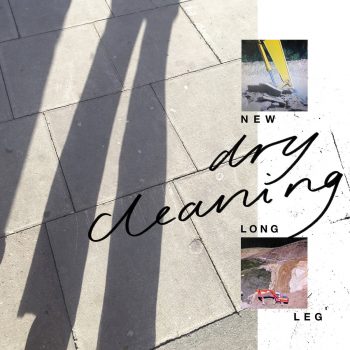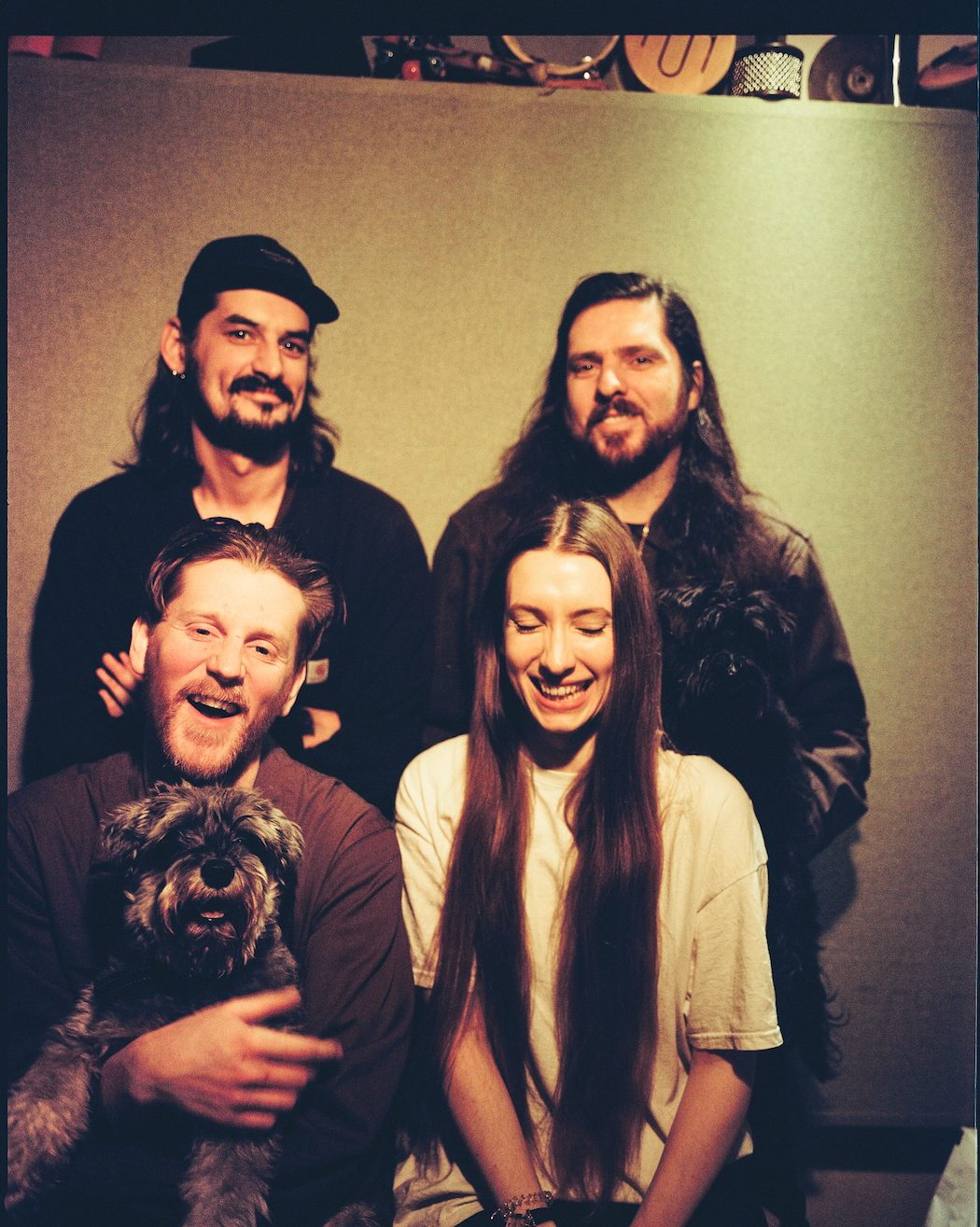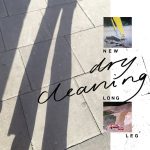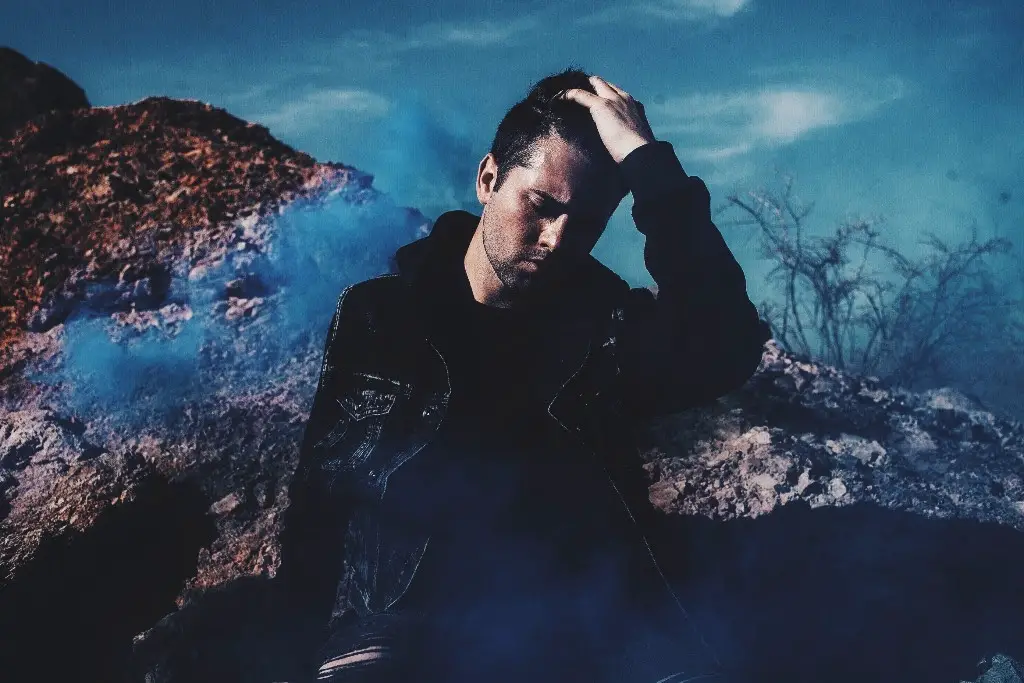Fans of Britain’s second rock invasion will have much to enjoy in Dry Cleaning’s debut, ‘New Long Leg’, an album both intimately familiar, yet wholly new. Just don’t tell them that.
Stream: ‘New Long Leg’ – Dry Cleaning
British post-punk is a first love. Without it, I may never have become a fan of rock and roll at all.
And I am dead serious.
Ever since that fateful Take-Your-Kid-To-Work-Day in downtown Portland, two facts of life were confirmed to an eight-year old creative: one, cubicle offices are an isolated hell of endless work with no perceptible end-product; and two, a compilation album by The Police is the only suitable drug to help a person through it.

The formula for this kind of love was simple: chopping guitars, a big bouncy bass, rock solid percussion and cattish vocals. The kind that place a person on a desert island, a low-gravity moon, a ratty hotel room or anywhere that was not 200 Market—the Black Box—tracing tiger faces next to mom.
That was the sonic. That was where I wanted to be, with Every Breath You Take, a collection of singles that could accompany me in a jail cell by any other name.
For Dry Cleaning, the new sensations from Britain, their debut album New Long Leg on experienced indie label 4AD just about scratches such an itch. Ask the band about their stylistic origins, however, and they play coy.
•• ••
Atwood Magazine: Which artists do you consider integral for someone to “understand” the sound of New Long Leg?
Dry Cleaning: I wouldn’t say anyone would need to frame the album to understand it, I think we make music that can be taken on face value. One of our strengths as a band is that we all have really different influences that we bring to the equation and we all appreciate each others input and in many ways, try and adapt each others influences into our own approach. As a consequence its impossible to say any artists that are ‘integral’ per se.
What lessons, if any, did you guys bring from recording the extended-players Boundary Road Snacks and Drinks and Sweet Princess?
Dry Cleaning: I think the recording sessions for the EPs were so short because of time and financial constraints so they were really a direct response to a set of circumstances. With New Long Leg we had much longer to work on the recording and in total isolation so it was a totally different experience. You are always learning new things with every undertaking and from those early recordings I think we really learned to trust our own musicianship and not overdo things, just capture the vibe of us playing and go from there.
Dry, wiry, sarcastic lyrical and guitar tones form a large part of New Long Leg; what was the charm of the aesthetic when writing and playing it? What drew you to it?
Dry Cleaning: I can’t say we were specifically drawn to any aesthetics as such, just the honest outcome of four characters cheating together. There is a lot of humour in our personalities and that gets into how we play and write but predominantly, we gravitate more towards sounds and subjects that have no clear, singular reading.
Is there a danger in having such a recognizable mode on a debut if you want to change it up for a sophomore record?
Dry Cleaning: I think this is a perception that New Long Leg already dispels really. There is much greater variety on it than the EPs which wasn’t a conscious decision, more the natural consequence of being a band for longer and writing more material together. “More Big Birds,” for example, inverts what roles we are each playing in the song- the guitar is more like the rhythmic backing and the drums are really out front not to mention Flo’s beautiful vocal melody.

•• ••
Post-punk encompasses a large part of Dry Cleaning’s critical reception in all of its indie glory across two extended-players. It is most likely the debut will be received in this manner as well.
The band disagrees with this summation, however, saying their music does not really require a framework to understand; accessibility was the overriding concern on New Long Leg. But it must be asked, even if rhetorically, how does post-punk not constitute a watchword for accessible alternative, even independent music?
Aside from a measured response that New Long Leg comprises both indie rock and post-punk, to pretend anything else is to drain a major part of the joy from the critique.
Dry Cleaning’s debut EP, Sweet Princess, was released in August of 2019 and with it, the first hit of an intoxicating musical project replete with enough layered guitarwork to give Johnny Marr a run for his money and a chic sound reminiscent of Elvis Costello.
At the time, almost no information existed on who or what comprised the band. Before much longer a follow-up, Boundary Road Snacks and Drinks, was released in October. Now, backed up by a veteran producer and a pair of extended-players under the belt, the members of Dry Cleaning make sure work of New Long Leg.
The band – consisting of Florence Shaw, Lewis Maynard, Tom Dowse, and Nick Buxton – continue to emulate counter-reformation aesthetics taut with scratchy, fuzzy, wiry layers. The majority of New Long Leg is guitar-based and makes no bones about it. A synthesizer noodles on the opening of “Leafy” and a piano keys in on “More Big Birds” but the meat of this album is that Smiths-based experiment in layers with an an energy akin to Three Imaginary Boys or Entertainment!.
It’s a solid, stolid yet nervous package of pure indie and post-punk energy, delivered in ten tracks with a now-not-so-secret weapon.
•• ••
Atwood Magazine: Florence, your lyrics are a deadpan delight, what is the writing process for choosing and connecting all these seeming disparate images?
Florence Shaw: The way I write lyrics changes often. But the simplest way I can describe it goes something like this. We write songs by jamming together, and like everyone else in the band I try things out. After a while of playing, a tone or a mood or a subject emerges and once I have that, I comb through my writing to find bits and bobs that chime with it or clash with it in an interesting way. A long while of doing this eventually leads to the lyrics being written.
The lyrics involve a lot of real-world consumption. Do you think it’s possible to wordsmith without namedropping Antiques Roadshow or Sainsbury or is that where the power lies when crafting realist lyrics?
Florence Shaw: It’s absolutely possible to write without using the brand names of things. It’s something that ends up in my lyrics naturally though. It would be an effort not to include them. Like all words, they have meanings and associations that are unique and useful.

•• ••
Listen to any project penned to Dry Cleaning’s oeuvre and the voice of Florence Shaw will draw one in with a stone-faced siren song.
Shaw’s lyrics are nonchalant, full of dry, wry, coy anecdotes and dialogue describing the addling effects of high-speed consumption and disjointed human contact. Each sentence uploads a bit of information directly to the eardrum.
The comedy across New Long Leg switches from lyric to guitar only to be sideswept by a seemingly random, obtuse throwaway line so deadpan in delivery that one can only chuckle or double take. Not until later, when sticking on Shaw’s lyrics with dogged abandon does the innocuous veneer peel to reveal she had been on the same track all along.
Shaw weaves a web of consumption, nervous tics and fragmented characters that will kaleidoscope and change the moment listeners dig deeper.
One of the more amusing asides is a bridge verse of “Leafy,” an honest-to-god experience peppered in between distraction techniques. Like a game, the narrator loses the moment she starts thinking about the unnamed ex. Quickly she switches back to mundane existence strolling through a drab countryside or knackering drinks at the pub. But for an instant, there was vulnerability.
Never talk about your ex
Never, never, never, never, never slag them off
Because then they know
Then they know
– “Leafy,” Dry Cleaning
Shaw even makes mirth of the ultimate megacut, “Every Day Carry” and its obtuse middle section, singing “Now it seems like none of the meant anything,” in the aftermath of of a series of chunky sound experiments.
All of this work reveals the band’s bettering instincts for balanced attack.
Producing the record is John Parish, the indefatigable collaborator and sonic engineer for PJ Harvey, Tracy Chapman and Aldous Harding. The esteemed producer’s penchant for female talent fit well to the schematics of Dry Cleaning, as Shaw’s voice would previously drown in the hurricane of Tom Dowse’s guitars. With Parish behind the control board, both of these elements now compliment each other.
Lewis Maynard’s bass, too, became more focused. Detailed grooves replace a general low-end hum and bounce that would wane in the face of the high-frequency arrangements. On the penultimate “A.L.C.” his bass is a laidback Jah Wobble special.
All of this provides a Shaw sounding boards to bounce her observations and piecemeal lyrics off of the music so that audiences can follow one thread, or just lose themselves in all of them.

•• ••
Atwood Magazine: New Long Leg features some great guitar interplay — in particular “Scratchcard Lanyard” — are individual parts sketched out alone or do you all jam together for a while and see what happens?
Dry Cleaning: It’s a mixture of both really. For my part, we can jam and improvise and I’ll take the recording home and if there’s something I like or has potential I’ll work on it at home then bring it back for the next practice. Likewise, I might come up with some things I’ve been playing at home and we might use those as a starting point for a jam. Essentially though, all our songs are ‘finished’ together in the practice room.
Explain to me why “Leafy” is not a lead single. It’s just that damn good. How did you guys bring out that soul/funk tinge in the song?
Dry Cleaning: We’re very glad you like it, we do too! “Leafy” was certainly a strong contender for a single but there are a lot of factors that go into deciding what a single will be and we welcomed the input from our team and label. The 3 songs we have chosen as singles before the album release compliment each other so we’re happy with our decision but yeah, ideally you would like all your songs to have the kind of attention a single gets but its not feasible.
“More Big Birds” showcases this lovely little piano melody. Did it form the basis for the cut, or was it added later?
Dry Cleaning: The piano part was added after as it essentially echoes the guitar underneath and that is how it appears live. It was a nice texture to introduce in that song and worked well so it was given some extra prominence in the mix.
The mid section of “Every Day Carry” sounds more like a soundlab than an actual instrumental break; did the midsection come first or was it all written from the ground up?
Dry Cleaning: The mid-section came about as a guitar improvisation that came after we had recorded the first section. We actually only had the final section from a wholly different composition when we started the recording so each part acts like a variation on that initial theme.
•• ••
The band benefited mightily from the time spent working on this record for a year.
Dry Cleaning and Parish used the serial pandemic lockdowns to polish New Long Leg and, while the record certainly sparkles, it does not make much of a leap from the extended-players. The original formula was so solid not much needed solving, just more refined arranging and mixing.
Despite the fast start of the lead single, “Scratchcard Lanyard,” there is a two-song recess before compositions bounce again. It’s not that “Unsmart Lady” or “Strong Feelings” are lackluster; “Scratchcard Lanyard” just performs incredibly well as an immediate yet perceptive Talking Heads-inspired bop.
New Long Leg also does not much move through many musical modes, but variations in tempo allow Shaw’s lyrics to piece together scattershot emotions and narratives at every cut. Neither is New Long Leg required to be instrumentally diverse; debuts generally are not. Instead “Leafy,” “More Big Birds” and “Every Day Carry” constitute as the more adventurous cuts on the record.

The funky, syncopating former track achieves that same level of standout musicality of “Scratchcard Lanyard” with an undeniable groove. It continues on to the jealous saga of “Her Hippo,” designing a love for Manuel and a disdain for contractors over guitars that become increasingly more irritable until Maynard’s bass comes to cool it all down.
“More Big Birds” sounds like a punk reading of a Carole King cut, invoking a lazy-day piano coda with a lead guitar dubbed over top and a choppy rhythm guitar in between.
And while the band may lose listeners with the experimental “Every Day Carry,” a Frankenstein cut constructed in three parts, they also take the piss and go right back into the groove. More important to Dry Cleaning’s success is that the debut doesn’t lose any instruments. The band succeed in this endeavour without exception. New Long Leg may have a set ingredients list, but it is neither rote nor overproduced and everything stays in the mix.
As consumption and fragmented human contact feature heavily in the majority of the lyrics, Dowse provides a multitude of parallels in his scratchy, earworm guitars, while drummer Nick Buxton and Maynard underpin it all with rock-solid triplets and off-kilter time signatures. The band works as as a unit to present narratives in stereoscopic images. What results is an album at once entirely musically coherent, yet topically diverse.
It may be coy, manic music, but it is a god damn good rock record.
— —
:: stream/purchase Dry Cleaning here ::
— — — —

Connect to Dry Cleaning on
Facebook, Instagram
Discover new music on Atwood Magazine
? © Steve Gullick
:: Stream Dry Cleaning ::









